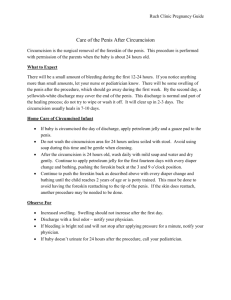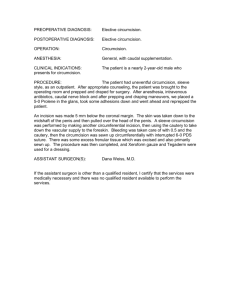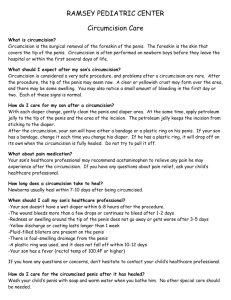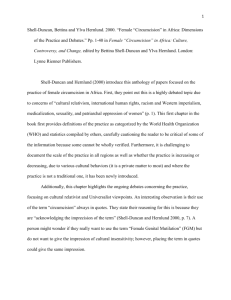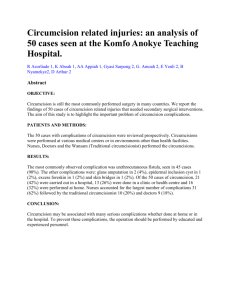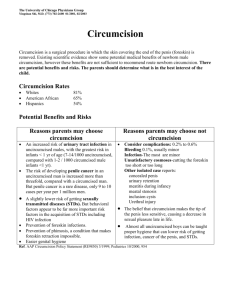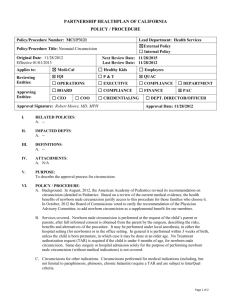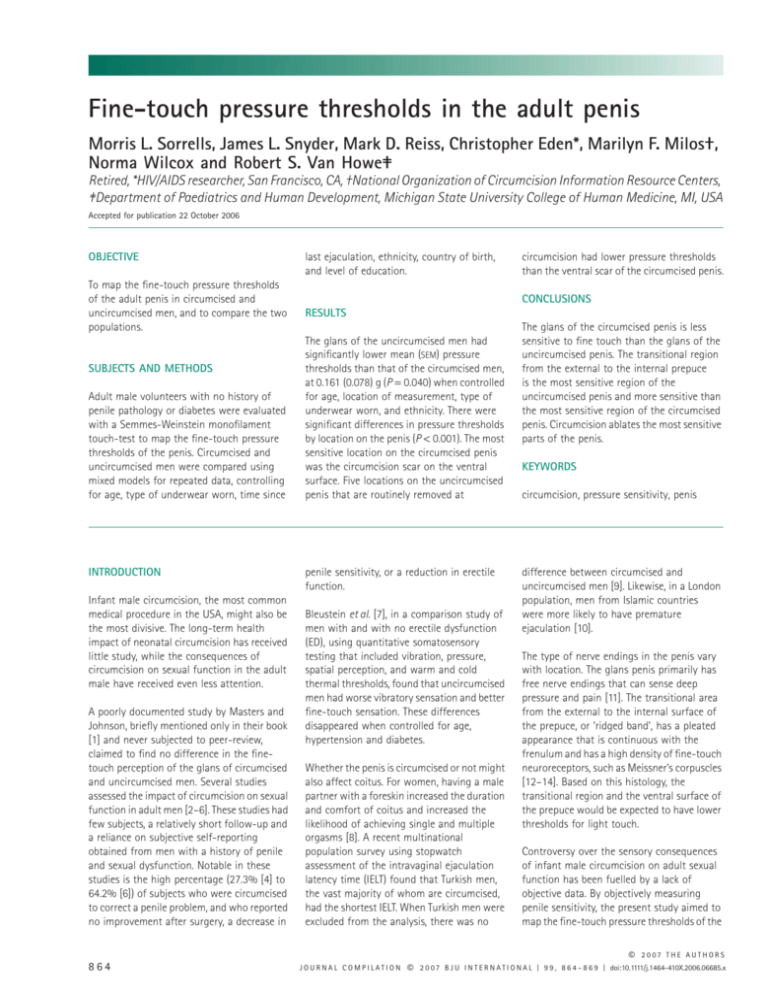
Sexual Medicine
FINE-TOUCH PRESSURE THRESHOLDS IN THE ADULT PENIS
SORRELLS
et al.
Fine-touch pressure thresholds in the adult penis
Morris L. Sorrells, James L. Snyder, Mark D. Reiss, Christopher Eden*, Marilyn F. Milos†,
Norma Wilcox and Robert S. Van Howe‡
Retired, *HIV/AIDS researcher, San Francisco, CA, †National Organization of Circumcision Information Resource Centers,
‡Department of Paediatrics and Human Development, Michigan State University College of Human Medicine, MI, USA
Accepted for publication 22 October 2006
OBJECTIVE
To map the fine-touch pressure thresholds
of the adult penis in circumcised and
uncircumcised men, and to compare the two
populations.
SUBJECTS AND METHODS
Adult male volunteers with no history of
penile pathology or diabetes were evaluated
with a Semmes-Weinstein monofilament
touch-test to map the fine-touch pressure
thresholds of the penis. Circumcised and
uncircumcised men were compared using
mixed models for repeated data, controlling
for age, type of underwear worn, time since
INTRODUCTION
Infant male circumcision, the most common
medical procedure in the USA, might also be
the most divisive. The long-term health
impact of neonatal circumcision has received
little study, while the consequences of
circumcision on sexual function in the adult
male have received even less attention.
A poorly documented study by Masters and
Johnson, briefly mentioned only in their book
[1] and never subjected to peer-review,
claimed to find no difference in the finetouch perception of the glans of circumcised
and uncircumcised men. Several studies
assessed the impact of circumcision on sexual
function in adult men [2–6]. These studies had
few subjects, a relatively short follow-up and
a reliance on subjective self-reporting
obtained from men with a history of penile
and sexual dysfunction. Notable in these
studies is the high percentage (27.3% [4] to
64.2% [6]) of subjects who were circumcised
to correct a penile problem, and who reported
no improvement after surgery, a decrease in
864
last ejaculation, ethnicity, country of birth,
and level of education.
circumcision had lower pressure thresholds
than the ventral scar of the circumcised penis.
CONCLUSIONS
RESULTS
The glans of the uncircumcised men had
significantly lower mean (SEM) pressure
thresholds than that of the circumcised men,
at 0.161 (0.078) g (P = 0.040) when controlled
for age, location of measurement, type of
underwear worn, and ethnicity. There were
significant differences in pressure thresholds
by location on the penis (P < 0.001). The most
sensitive location on the circumcised penis
was the circumcision scar on the ventral
surface. Five locations on the uncircumcised
penis that are routinely removed at
penile sensitivity, or a reduction in erectile
function.
Bleustein et al. [7], in a comparison study of
men with and with no erectile dysfunction
(ED), using quantitative somatosensory
testing that included vibration, pressure,
spatial perception, and warm and cold
thermal thresholds, found that uncircumcised
men had worse vibratory sensation and better
fine-touch sensation. These differences
disappeared when controlled for age,
hypertension and diabetes.
Whether the penis is circumcised or not might
also affect coitus. For women, having a male
partner with a foreskin increased the duration
and comfort of coitus and increased the
likelihood of achieving single and multiple
orgasms [8]. A recent multinational
population survey using stopwatch
assessment of the intravaginal ejaculation
latency time (IELT) found that Turkish men,
the vast majority of whom are circumcised,
had the shortest IELT. When Turkish men were
excluded from the analysis, there was no
The glans of the circumcised penis is less
sensitive to fine touch than the glans of the
uncircumcised penis. The transitional region
from the external to the internal prepuce
is the most sensitive region of the
uncircumcised penis and more sensitive than
the most sensitive region of the circumcised
penis. Circumcision ablates the most sensitive
parts of the penis.
KEYWORDS
circumcision, pressure sensitivity, penis
difference between circumcised and
uncircumcised men [9]. Likewise, in a London
population, men from Islamic countries
were more likely to have premature
ejaculation [10].
The type of nerve endings in the penis vary
with location. The glans penis primarily has
free nerve endings that can sense deep
pressure and pain [11]. The transitional area
from the external to the internal surface of
the prepuce, or ‘ridged band’, has a pleated
appearance that is continuous with the
frenulum and has a high density of fine-touch
neuroreceptors, such as Meissner’s corpuscles
[12–14]. Based on this histology, the
transitional region and the ventral surface of
the prepuce would be expected to have lower
thresholds for light touch.
Controversy over the sensory consequences
of infant male circumcision on adult sexual
function has been fuelled by a lack of
objective data. By objectively measuring
penile sensitivity, the present study aimed to
map the fine-touch pressure thresholds of the
©
JOURNAL COMPILATION
©
2 0 07 T H E A U T H O R S
2 0 0 7 B J U I N T E R N A T I O N A L | 9 9 , 8 6 4 – 8 6 9 | doi:10.1111/j.1464-410X.2006.06685.x
FINE-TOUCH PRESSURE THRESHOLDS IN THE ADULT PENIS
FIG. 1. Locations on the dorsal penis evaluated for
fine-touch pressure thresholds.
FIG. 2. Locations on the ventral penis evaluated for
fine-touch pressure thresholds.
1.
SHAFT PROXIMAL
TO CORONAL
RIDGE
2.
OUTER
PREPUCE
3.
ORIFICE
RIM
4.
MUCOCUTANEOUS
JUNCTION
5.
RIDGED
BAND
6.
PREPUTIAL
MUCOSA
7.
SULCUS
8.
CORONAL
RIDGE
9.
MIDDLE
OF GLANS
10.
GLANS
AT MEATUS
11.
CORONAL
RIDGE
12.
FRENULUM
AT URETHRAL
SLIT
13.
FRENULUM
NEAR
RIDGED BAND
14.
FRENULUM AT
MUCO-CUTANEOUS
JUNCTION
15.
ORIFICE
RIM
16.
OUTER
PREPUCE
17.
SHAFT PROXIMAL
TO CORONAL
RIDGE
18.
SCAR /
DORSAL
SURFACE
19.
SCAR /
VENTRAL
SURFACE
penis and quantify the differences in penile
sensitivity between men with and without
foreskins.
SUBJECTS AND METHODS
Subjects were recruited by posting ‘fliers’ at
the San Francisco Bay Area medical school.
Also, announcements were made on a medical
radio programme, and advertisements were
placed in local Bay Area general circulation
newspapers.
Subjects were men aged >18 years in good
health, with no genital alterations, except for
circumcision, as determined by healthscreening questions. A short questionnaire
was completed to determine ethnicity, place
of birth, highest education degree obtained,
type of underwear worn, timing of last
ejaculation, referral source, and health status.
Circumcision status was determined by a
physical examination.
Exclusion criteria were: transsexuals; intersex
individuals; males born with abnormal
©
genitals, e.g. hypospadias; a history of
diseases or conditions known to affect sexual
sensitivity and function, e.g. diabetes mellitus;
a history of genital, prostate, or urinary tract
disease of any kind, including but not limited
to sexually transmitted diseases, open sores,
or lesions at the time of screening; prostatitis;
prostate cancer; BPH; spinal cord injury;
peripheral nerve injury; peripheral
neuropathy; sciatica; any penile piercing;
penile enlargement surgery; any form of
psychiatric condition; or a history of alcohol
or substance abuse. Informed consent was
obtained before testing.
The fine-touch sensitivity of 19 locations on
the penis was measured using SemmesWeinstein monofilament touch-test sensory
evaluators (North Coast Medical Supply,
Morgan Hill, CA, USA) [15–17] to create a
penile sensitivity map (Figs 1 and 2)
On the dorsum of the penis, these locations
were: (1) the shaft proximal to coronal ridge;
(2) the outer prepuce; (3) the rim of the
preputial orifice; (4) the muco-cutaneous
junction; (5) the ridged band; (6) the preputial
mucosa; (7) the coronal sulcus; (8) the coronal
ridge; (9) the middle of dorsal aspect of the
glans; (10) the glans at the meatus; on the
ventral surface of the penis, the locations
were (11) the coronal ridge; (12) the frenulum
at the urethral slit; (13) the frenulum near the
ridged band; (14) the frenulum at the mucocutaneous junction; (15) the rim of the
preputial orifice; (16) the outer prepuce; (17)
the shaft proximal to the coronal ridge; and
locations pertaining to circumcised men only
(18) the circumcision scar on the dorsal
surface and (19) the circumcision scar on the
ventral surface. Locations 2–5 and 13–16
were measured only in uncircumcised men
because these locations are ablated by
circumcision.
Because of the method of data collection, it
was impossible for the physician measuring
the fine-touch thresholds to be unaware of
the circumcision status of the subject.
Likewise, because of the number of locations
sampled, it was also impossible for the
statistician to be unaware of the circumcision
status of the subject.
Based on unpublished pilot data, it was
determined that sampling 50 uncircumcised
and 150 circumcised men would have 80%
power to show a difference of 0.046 g with a
type I error of 5%. Demographic information
by circumcision status were compared using
Mantel-Haenszel, Fisher’s exact, chi-square
and t-tests. Fine-touch pressure thresholds by
location were compared using t-tests and
linear regression. Mixed models for repeated
data on single subjects stratified by location
of measurement, which control for withinsubject variability, were developed using
locations present in both the circumcised and
the complete penis. Models were assessed
using forward, backwards and stepwise
selection. Similar models were developed
using only locations on the glans penis. This
study protocol was approved by the Western
Institutional Review Board.
RESULTS
In all, 163 subjects were enrolled; one
uncircumcised man was excluded for
diabetes, two uncircumcised men and one
circumcised man were excluded for
hypospadias. All of the men completed the
2 0 07 T H E A U T H O R S
JOURNAL COMPILATION
©
2 0 07 B J U I N T E R N AT I O N A L
865
S O R R E L L S ET AL.
testing once it started. A comparison of the
demographic information by circumcision
status is shown in Table 1. Men born outside
the USA were eight times more likely to be
uncircumcised.
Fine-touch pressure thresholds for each of
the penile positions is shown in Table 2 and
Fig. 3. The region most sensitive to fine
touch on the circumcised penis was the
circumcision scar. The ventral scar was more
sensitive than the dorsal scar (t-test and signtest P < 0.001). In all but one position, finetouch pressure thresholds were greater in the
circumcised penis. The most sensitive regions
in the uncircumcised penis are those removed
by circumcision. There was no interaction
between age and circumcision status.
When compared with the most sensitive area
of the circumcised penis, several locations on
the uncircumcised penis, which are missing
from the circumcised penis, were significantly
more sensitive (Table 2).
There was no association between fine-touch
pressure threshold and the ambient room
temperature at the time of the examination,
the time since the reported last ejaculation
(P = 0.659), or the country of birth.
TABLE 1 The demographics of the subjects by circumcision status
Measure
Mean (SD) age, years
Born outside USA, n (%)
Ethnicity
Caucasian, %
Level of education, n(%)
High school
Associate’s degree
Bachelor’s degree
Graduate school
Master’s degree
PhD, JD, MD
Underwear
Briefs
Boxers
None
Both
Referral source, n
Newspaper
Radio
Friend
Internet
Flyer
Study leader
Mean (SD) days since last ejaculation
Not circumcised (68)
51.0 (12.9)
23 (34)
Circumcised (91)
48.3 (12.5)
5 (5.5)
Comparison
0.180*
8.79 (3.13–24.68)†
0.217‡
0.42 (0.20–0.90)†
0.278¶
67
83
10 (15)
3 (4)
35 (51)
9 (13)
8 (12)
3 (4)
15 (16)
2 (2)
40 (44)
8 (9)
17 (19)
9 (10)
34 (50)
19 (28)
12 (18)
3 (4)
50 (55)
21 (23)
15 (16)
5 (5)
0.625‡
0.630§
0.580§
1.00§
1.00§
6
6
16
4
1
5
2.38 (2.47)
15
16
13
6
4
13
2.69 (3.46)
0.531
* P for t-test; †odds ratio (95% CI); ‡P for chi-square test; ¶P for trend analysis; §P for Fisher’s exact test.
TABLE 2 Mean fine-touch pressure threshold value (g) by position and circumcision status, and differences in fine-touch pressure threshold between the ventral
scar (Position 19) and the position found only on the uncircumcised penis
Position
1
2
3
4
5
6
7
8
9
10
11
12
13
14
15
16
17
18
19
866
Not circumcised
(SEM)
0.681 (0.135)
0.2941 (0.046)
0.093 (0.027)
0.192 (0.041)
0.205 (0.036)
0.371 (0.069)
0.519 (0.085)
0.778 (0.112)
1.141 (0.163)
0.979 (0.158)
0.952 (0.155)
0.407 (0.063)
0.177 (0.044)
0.159 (0.045)
0.230 (0.129)
0.353 (0.132)
0.759 (0.188)
Circumcised
(SEM)
0.716 (0.081)
0.445 (0.063)
0.7099 (0.105)
0.941 (0.097)
1.180 (0.117)
0.911 (0.1406)
1.1273 (0.151)
0.433 (0.081)
0.562 (0.095)
0.333 (0.045)
0.192 (0.034)
Age-adjusted difference
(% decrease)
0.50 (7.0)
Difference, g
P (t-test)
Difference adjusted
for age
P
+0.104
−0.095
−0.003
−0.083
0.0698
0.0307
0.9530
0.7474
+0.086
−0.111
−0.017
−0.002
0.1175
0.0136
0.7463
0.9673
−0.012
−0.029
+0.041
+0.1617
0.8311
0.5991
0.7571
0.2328
−0.027
−0.045
+0.014
+0.135
0.6229
0.4134
0.9045
0.2614
0.113 (25.3)
0.238 (33.6)
0.228 (24.2)
0.129 (10.9)
0.024 (2.6)
0.255 (22.6)
0.057 (13.2)
−0.127 (−22.6)
©
JOURNAL COMPILATION
©
2 0 07 T H E A U T H O R S
2 0 07 B J U I N T E R N AT I O N A L
FINE-TOUCH PRESSURE THRESHOLDS IN THE ADULT PENIS
FIG. 3. Fine-touch pressure thresholds (g) by location on the adult penis, comparing uncircumcised men (red
bars) and circumcised men (green bars), with a range of one SD shown with the error bars.
1.4
The Semmes-Weinstein monofilaments are
individually calibrated to deliver a targeted
force within a 5% SD. They have been used to
test female genital sensitivity [17] and can
be used to determine changes in sensitivity
over time.
Pressure Threshhold (grams)
1.2
1
0.8
0.6
0.4
0.2
0
1
Variable
Penis
Circumcision
Hispanic
Briefs
Age (years)
Location
Glans Penis
Circumcision
Hispanic
Briefs
Age (years)
Location
2
3
4
5
6
7
8
9
10 11 12 13 14 15 16 17 18 19
Position
Estimate, g
SEM
t-value or F-value*
P
−0.1554
−0.214
−0.203
0.011
0.0761
0.133
0.075
0.003
−2.04
−1.61
−2.71
3.66
13.69*
0.0431
0.1104
0.0075
0.0004
<0.0001
−0.161
−0.207
−0.212
0.013
0.078
0.135
0.076
0.003
−2.07
−1.53
−2.77
4.21
17.64*
0.0398
0.1293
0.0063
<0.0001
<0.0001
Using a mixed model to evaluate repeated
measures, location of the measurement, age,
wearing briefs, level of education, being
Hispanic, and circumcision status were all
statistically significant in the multivariate
models (Table 3), e.g. with each year of age,
the fine-touch pressure threshold increased
by 0.011 or 0.013 g.
DISCUSSION
The glans in the circumcised male is less
sensitive to fine-touch pressure than the
glans of the uncircumcised male. The most
sensitive location on the circumcised penis is
©
testing locations that provide the most
differentiation.
TABLE 3
The mixed model for
repeated measures using
locations found on both the
circumcised and
uncircumcised penis, and
only on the glans penis
the circumcision scar on the ventral surface.
Five locations on the uncircumcised penis
that are routinely removed at circumcision
were more sensitive than the most sensitive
location on the circumcised penis.
Despite the controversy over the long-term
impact of male circumcision, no thorough,
objective, quantitative studies measuring the
long-term sensory consequences of infant
circumcision have hitherto been reported. The
present study provides the first extensive
mapping of the fine-touch pressure
thresholds of the adult penis. This information
provides a baseline for future comparison
studies and provides investigators with the
It is difficult to compare our data and results
with those claimed by Masters and Johnson
[1]; no method is documented, only their
assertion of no difference in fine-touch
reception on the glans. Nevertheless, their
results, even if they were verifiable, are of
little value to the question of the long-term
sensory consequences of infant circumcision.
First, the glans has virtually no fine-touch
neuroreceptors [11–14]. Second, when
determining the aggregate sensory impact
of circumcision, the sensory effects of
circumcision on the glans are of secondary
significance, because the glans is not removed
during circumcision. Instead of measuring
changes in the glans after circumcision, it is
more important to measure the sensory
investment of the parts of the penis removed
by circumcision.
In a subjective study with only a 44%
response rate, Fink et al. [2] questioned men,
using an unvalidated survey tool that they
hoped would measure sexual function.
Compared to before circumcision, men
reported reduced erectile function (P = 0.01),
decreased penile sensitivity (P = 0.08), no
changes in sexual activity, and improved
satisfaction after circumcision. The
circumcisions were for ‘medical reasons’ in
88%. For a procedure that was expected to
correct their problem, entirely favourable
outcomes would be expected, but 38%
reported a perceived problem or difficulty as a
result of the procedure.
Collins et al. [3] studied 15 men who were
circumcised as adults; all but one had a penile
problem. The patients completed the Brief
Male Sexual Function Inventory, an
unvalidated measure of sexual function,
before and at least 12 weeks after the
procedure. Not surprisingly, this underpowered study failed to find any differences
in sex drive, erection, ejaculation, problem
assessment, or overall satisfaction. This is an
intriguing finding because the men were
circumcised expecting an improvement in
sexual function and satisfaction.
2 0 07 T H E A U T H O R S
JOURNAL COMPILATION
©
2 0 07 B J U I N T E R N AT I O N A L
867
S O R R E L L S ET AL.
In a study designed to measure the impact of
anterior urethroplasty on erectile function,
Coursey et al. [4] included a control group of
men who were circumcised for ‘phimosis or
other benign indication’. Of the 48 men
circumcised, only 22 (46%) completed the
survey. Using an internally validated survey,
27% reported worsening satisfaction with
their erectile function after a procedure.
In a Turkish population of 42 men in their
third decade undergoing circumcision, 39 of
whom sought circumcision for religious
reasons, the Brief Male Sexual Function
Inventory, measured before and at least
12 weeks after the procedure, showed no
difference in any of the five areas assessed by
the instrument. However, the mean IELT was
significantly longer after circumcision
(P = 0.02) [5]. As noted earlier, Turkish men
had the shortest mean IELT of the countries
assessed [9].
In a study of 95 men undergoing circumcision
in China, erectile function was measured
before and after surgery. Eighteen patients
reported mild erectile dysfunction before
circumcision, while 28 reported from mild
to moderate erectile dysfunction after
circumcision (P = 0.001). Also reported were
increased problems with weakened erectile
confidence (P = 0.04), difficult insertion
during coitus (P = 0.03), prolonged
intercourse in 31 cases (P = 0.04), and
improved satisfaction in only 34 patients
(P = 0.04) [6].
In a study of 125 men drawn from a urology
clinic, Bleustein et al. [7] found that
uncircumcised men, both with and with no
erectile dysfunction, had lower thresholds for
pressure using the same device as used in the
present study. The differences they found
were no longer statistically significant when
adjusted for age, diabetes, and hypertension.
Their age difference (7 years) was greater
than in the present population. Their
population consisted of patients referred to a
urologist; the present subjects were drawn
from the general population, and diabetics
were excluded. We did not enquire about
hypertension nor measure blood pressure.
Bleustein et al. only sampled two locations,
the meatus and the dorsal glans halfway
between the meatus and the corona, in
circumcised men, with an additional sample
in uncircumcised men at the ‘dorsal midline
foreskin’ with the prepuce in its natural
position over the glans. In uncircumcised
868
men, there were no significant differences
between the measurements taken at the glans
with the foreskin retracted and those taken at
the level of the glans with the foreskin in its
normal position. The positions used in that
study correlate to positions 9, 10 and 16 in the
present study. In our mixed model, controlling
for location of the measurement, age, wearing
briefs, being Hispanic, and circumcision
status, position 10 had a lower threshold than
position 9 (−0.243 g, SEM 0.079, P < 0.002).
The present data indicated that the location
on the uncircumcised penis measured by
Bleustein et al. had one of the highest
thresholds of the locations found only
on the uncircumcised penis. We found
that the age-adjusted thresholds were
significantly lower in location 16 than either
9 or 10 (location 9, −0.75 g, SEM 0.184,
P < 0.001; location 10, −0.56 g, 0.17,
P < 0.002).
The studies detailed above share several
important flaws: (i) a low response rate to
opportunities to complete surveys (it is
speculative as to how the half who did not
complete these surveys would have
responded); (ii) the lack of agreed upon,
externally validated instruments to measure
erectile function; (iii) small population sizes
that limit the study power; (iv) the subjective
nature of instruments used; (v) short followup times; and (vi) the patients in the studies
were not genitally healthy.
The last three items deserve special comment.
Self-reporting is notoriously unreliable, and
all but one of the reported studies relied on
patient testimony rather than objective
measurements. Patients are highly susceptible
to suggestions or inferences that surgery or
treatments used to correct a problem will, in
fact, correct that problem. Also, otherwise
healthy men who seek circumcision for other
than medical reasons are predisposed to
reporting a favourable outcome. Furthermore,
surveys with subjective measures are
dependent on the respondent’s state of
health. When asked to rate quality of life of
various impaired health states, healthy
individuals will rate the quality lower than will
a person in that particular health state. In
these studies, it would be expected that the
men rate their genital performance higher
when in the genitally impaired condition than
if they were not genitally impaired.
The short follow-up might have precluded
changes in genital response and sensitivity
that take longer to develop. Likewise, the
acute changes from surgery and scar
remodelling are known to take up to
12 months to resolve [18]. Finally, except for
the Turkish study, the men in these studies
had penile pathology. Consequently,
improvements in this population would be
expected regardless of the intervention, due
to what is commonly referred to as the ‘floor
effect’ (more room for improvement than
deterioration). Consequently, the worsening
in so many subjects is remarkable. It could be
concluded that circumcision might be an
invalid intervention for these medical
conditions.
The present subjects, while drawn from the
general population, were men who showed
the initiative to participate. This might
introduce a population and selection bias, but
the objective nature of the measure should
not have been affected. In the USA,
uncircumcised men are demographically
different from circumcised men. They tend
to be younger and from certain ethnic
backgrounds. They might also be from
families with either higher or lower parental
education levels, depending on the decade of
their birth [19,20]. Younger men might have
been less willing to participate in the study
due to their increased modesty. As there are
many more circumcised than uncircumcised
men in the USA, recruiting equal numbers of
subjects from each group was challenging.
The measurement of fine touch using
pressure thresholds might be limited. Fine
touch transmitted through Meissner’s
corpuscles might be dynamic, using a network
of nerve endings. For example, the fingertips,
which have a high density of Meissner’s
corpuscles, are able to interpret Braille when
moving over raised dots, not merely by
pressing on them. Consequently, a static
measurement of pressure threshold can miss
much of what the Meissner’s corpuscles are
capable of transmitting. An instrument that
measures the sensitivity to light brushing or
that can discriminate surface texture when
rubbing might be needed to measure this
dynamic sensation.
The differences in age, based on circumcision
status, were expected. In their study, Bleustein
et al. [7] found that uncircumcised men were
a mean of 7 years older. Based on the
fluctuations of circumcision rates over the
past century, we expected genital integrity to
be more prominent among older men and
©
JOURNAL COMPILATION
©
2 0 07 T H E A U T H O R S
2 0 07 B J U I N T E R N AT I O N A L
FINE-TOUCH PRESSURE THRESHOLDS IN THE ADULT PENIS
among men in their twenties. Because the
confidence, sufficient to volunteer for
mapping of genitalia, might not come until
the later twenties, this population might have
been under-represented in our study.
Additional study with vibratory, hot and cold
thresholds on a wider variety of positions
on the penis is needed. Furthermore,
development of a reliable method of
measuring dynamic sensation is needed to
identify, elucidate and quantify the sensory
capacity of the various nerve endings in all
parts of the penis, and to provide a greater
understanding of the dynamic sensory
interplay between the various parts of the
uncircumcised penis during sexual activity.
Finally, prospective real-time stopwatch
assessments of the IELT at coitus in men,
investigated in the laboratory by the SemmesWeinstein touch test, would provide
additional objective information of their
sexual and particularly ejaculatory
performance. Long-term monitoring of
numerous factors of sexual pattern, including
sexual pattern films, would provide additional
information. Ideally, such investigations could
be undertaken on adult subjects before and
after elective circumcision, and in whom there
is no preoperative pathology.
In conclusion, circumcision removes the most
sensitive parts of the penis and decreases
the fine-touch pressure sensitivity of glans
penis. The most sensitive regions in the
uncircumcised penis are those parts ablated
by circumcision. When compared to the most
sensitive area of the circumcised penis,
several locations on the uncircumcised penis
(the rim of the preputial orifice, dorsal and
ventral, the frenulum near the ridged band,
and the frenulum at the muco-cutaneous
junction) that are missing from the
circumcised penis were significantly more
sensitive.
manuscript, and approved the final version.
Norma Wilcox, RN contributed to the
conception and design of the study, revision
of the manuscript, and approved the final
version. Robert S. Van Howe, MD, MS
contributed to the design of the study and the
analysis and interpretation of the data,
drafted the article and revised it critically, and
approved the final version.
12
None declared. Source of funding: National
Organization of Circumcision Information
Resource Centers. The director of National
Organization of Circumcision Information
Resources Centers (MFM) was involved in the
design and conduct of the study; collection
and interpretation of the data; and review, or
approval of the manuscript.
13
14
15
REFERENCES
1
2
3
4
5
ACKNOWLEDGEMENTS
©
11
CONFLICT OF INTEREST
6
Author contributions: Morris L. Sorrells, MD,
James L. Snyder, MD, Mark D. Reiss, MD, and
Christopher Eden, MD contributed to the
conception and design of the study, the
acquisition of data, revision of the
manuscript, and approved the final version.
Marilyn F. Milos, RN contributed to the
conception and design of the study, the
acquisition of data, the interpretation of the
data, obtained funding, revision of the
10
7
8
9
Masters W, Johnson V. Human Sexual
Response. Boston, MA: Little Brown & Co,
1966
Fink KS, Carson CC, DeVellis RF. Adult
circumcision outcomes study: effect on
erectile function, penile sensitivity, sexual
activity and satisfaction. J Urol 2002; 167:
2113–6
Collins S, Upshaw J, Rutchik S,
Ohannessian C, Ortenberg J, Albertsen
P. Effects of circumcision on male sexual
function: debunking a myth? J Urol 2002;
167: 2111–2
Coursey JW, Morey AF, McAninch JW
et al. Erectile function after anterior
urethroplasty. J Urol 2001; 166: 2273–6
Senkul T, Iseri C, Sen B, KarademIr K,
Saracoglu F, Erden D. Circumcision in
adults: effect on sexual function. Urology
2004; 63: 155–8
Shen Z, Chen S, Zhu C, Wan Q, Chen Z.
[Erectile function evaluation after adult
circumcision]. Zhonghua Nan Ke Xue
2004; 10: 18–9
Bleustein CB, Fogarty JD, Eckholdt H,
Arezzo JC, Melman A. Effect of neonatal
circumcision on penile neurologic
sensation. Urology 2005; 65: 773–7
O’Hara K, O’Hara J. The effect of male
circumcision on the sexual enjoyment of
the female partner. BJU Int 1999; 83
(Suppl. 1): 79–84
Waldinger MD, Quinn P, Dilleen M,
Mundayat R, Schweitzer DH, Boolell M.
16
17
18
19
20
A multinational population survey of
intravaginal ejaculation latency time.
J Sex Med 2005; 2: 492–7
Richardson D, Goldmeier D. Premature
ejaculation – does country of origin tell us
anything about etiology? J Sex Med 2005;
2: 508–12
Halata Z, Munger BL. The
neuroanatomical basis for the
protopathic sensibility of the human
glans penis. Brain Res 1986; 371:
205–30
Winkelmann RK. The cutaneous
innervation of human newborn prepuce.
J Invest Dermatol 1956; 26: 53–67
Taylor JR, Lockwood AP, Taylor AJ. The
prepuce: specialized mucosa of the penis
and its loss to circumcision. Br J Urol
1996; 77: 291–5
Cold CJ, Taylor JR. The prepuce. BJU Int
1999; 83 (Suppl. 1): 34–44
Bell-Krotoski J, Tomancik E. The
repeatability of testing with SemmesWeinstein monofilaments. J Hand Surg
[Am] 1987; 12: 155–61
Vileikyte L, Hutchings G, Hollis S,
Boulton AJ. The tactile circumferential
discriminator. A new, simple screening
device to identify diabetic patients at risk
of foot ulceration. Diabetes Care 1997;
20: 623–6
Romanzi LJ, Groutz A, Feroz F, Blaivais
JG. Evaluation of female external
genitalia sensitivity to pressure/touch: a
preliminary prospective study using
Semmes-Weinstein monofilaments.
Urology 2001; 57: 1145–50
McNamara RN, Loiselle J. Laceration
repair. In Henretig F, King C eds, Textbook
of Pediatric Emergency Procedures.
Baltimore, MD: Williams and Wilkins,
1997: 1141
Laumann EO, Masi CM, Zuckerman EW.
Circumcision in the United States:
prevalence, prophylactic effects, and
sexual practice. JAMA 1997; 277: 1052–7
Walton RE, Ostbye T, Campbell MK.
Neonatal male circumcision after
delisting in Ontario. Survey of new
parents. Can Fam Physician 1997; 43:
1241–7
Correspondence: Robert S. Van Howe,
1414 W. Fair Avenue, Suite 226, Marquette, MI
49855, USA.
e-mail: rsvanhowe@mgh.org
Abbreviations: IELT, intravaginal ejaculation
latency time.
2 0 07 T H E A U T H O R S
JOURNAL COMPILATION
©
2 0 07 B J U I N T E R N AT I O N A L
869

